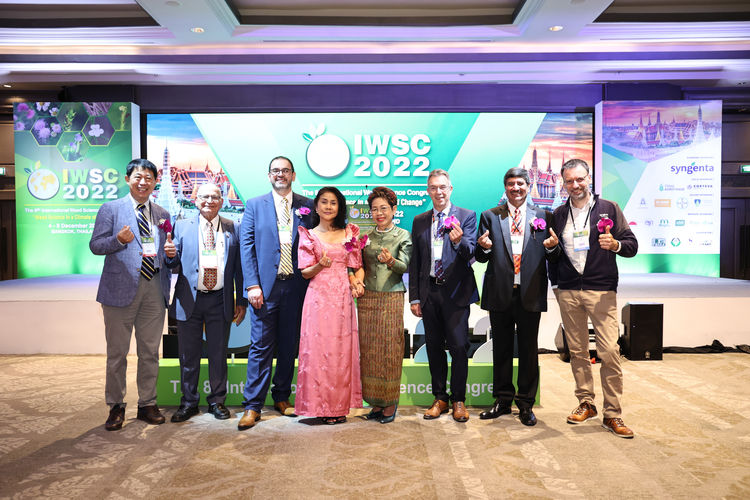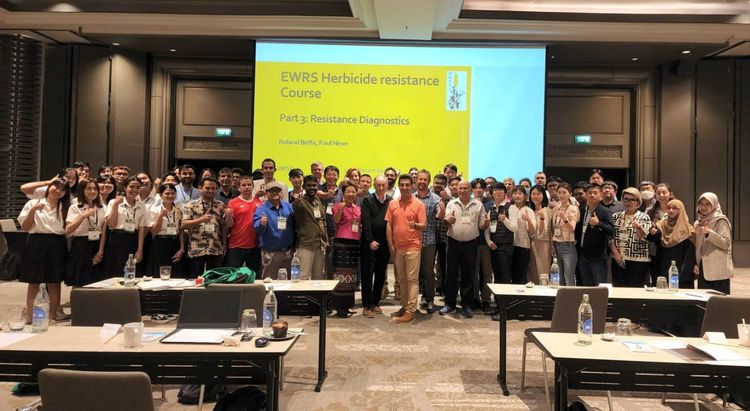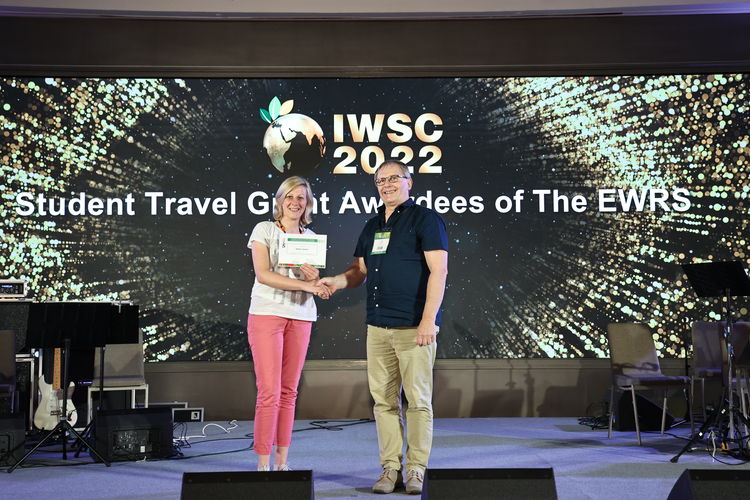Minutes from the 8th International Weed Science Congress "Weed Science in a Climate of Change" in Bangkok, 4-9 December 2022
After two years of postponement, the 8th International Weed Science Congress entitled "Weed Science in a Climate of Change" was held between 4th and 9th December 2022 in the Marriott Marquis Queen’s Park hotel, Bangkok, Thailand. The EWRS traditionally takes an active part in the preparation of the scientific program. The congress hosted 350 delegates from 44 countries, which was a good number considering the uncertainty and limitations still resulting from COVID pandemics circumstances.
Opening ceremony
From left to right: Drs. Do-Soon Kim (IWSS Vice-President), Baruch Rubin (IWSS Ex. Officio), Luis Avila (IWSS Secretary, SPC Chairman), Nilda R. Burgos (IWSS Past President), Chanya Maneechote (WSST President, LoCom Chair), Martin Kropff (keynote speaker, EWRS past President), Samundrer Singh (IWSS President), Syngenta representative.
The congress started on Sunday with well attended pre-congress workshop "Confirming and characterizing herbicide resistance" which was organized by the EWRS Education & Training Working Group led by Dr. Lena Ulber. The aim of the workshop was to provide attendees with an overview of the steps required to identify, confirm and manage herbicide resistance. The lecturers were Prof. Dr. Paul Neve and Dr. Roland Beffa, former and current coordinators of the EWRS WG Herbicide Resistance. The meeting was evaluated highly by all attendees which resulted in an invitation to organize similar pre-conference workshop for Asian-Pacific Weed Science Society being held next year in Thailand. Both lecturers, as well as promoters of the event Dr. Lena Ulber and our Scientific Secretary, Prof. Dr. Husrev Mennan deserve sincere thanks for highlighting our Society in the eyes of participants.
Participants of the EWRS pre-congress workshop (organizers Roland Beffa, Husrev Mennan and Paul Neve in the center of the group)
The congress consisted of plenary lectures addressing the latest vibrant societal issues in a relation to weed science and 14 broader main topics: Herbicide Resistance, Weed Biology and Ecology, Integrated Weed Management, Climate Aspects of Weed Science, Non-Chemical Weed Control, Application Technology, Economic and Social Aspects of Weed Management, Invasive and Parasitic Plant Species, Environmental Fate of Herbicides, Physiology of Plants and Herbicide Interaction, Weed Issues in Asia, New Technology for Weed Management, Weed 'Omics', and Modelling. The program committee made a very nice selection of keynote speakers. The first keynote speaker was Prof. Dr. Martin Kropff (EWRS President 1999-2000); an excellent speaker with experience not only in weed science, but more recently also as an expert in global food security. His speech Tackling global crop production challenges for sustainable food and nutrition security clearly demonstrated the need for transfer of knowledge and rational intensification in developing countries to feed the planet in a long-term perspective, including the crucial role of weed management to minimize the yield gap. Other keynote speakers addressed the latest developments in weed robotics for site specific weed management, perspectives on the future of weed science and contribution of gene editing as a tool for weed management and climate resilient crops. Four main topics were organized under the leadership of EWRS representatives: Prof. Dr. Jonathan Storkey (UK) – Climate Aspects of Weed Science, Dr. Jose L. Gonzalez-Andujar (Spain) – Modelling, Dr. Marleen Riemens (Netherlands) – Non-Chemical Weed Control, and Dr. Michaela Kolá?ová (Czech Republic) – Weed Biology and Ecology. The function of MTOs is a crucial role for the success of each congress. Our people made a good impression by taking on the time-consuming job and doing good work evaluating and revising of abstracts, communicating with authors, organizing and chairing sessions, and finally, representing the EWRS - thanks for that!
As usual, the EWRS has financially supported selected early career scientists from all over the World based on evaluation of applications conducted by our Scientific Secretary, Prof. H. Mennan. From the European and Mediterranean region, the awardees Sabine Andert (Germany), Ido Walk, Idan Shachar Roth, and Sahar Malka (all from Israel) did a great job and represented European science well. The awards to selected young scientists were ceremoniously dedicated by the EWRS President during the Closing Ceremony together with travel grants by the IWSS.
Josef Soukup dedicates the EWRS travel grant certificate to Sabine Andert
The entire period of the congress was enriched by many social events and time for socializing and discussions. The Welcome Reception and Closing Ceremony were an especially great opportunity for a social interaction and networking among participants, as well as coffee breaks. Another great part of the conference, the IWSS organized a “student´s night” for establishing contacts between young scientists from different geographies. The last day of the congress was dedicated to field excursions according to personal preference of participants. They visited two research stations with focus on weed management including herbicide resistance in rice, cassava and other regional crops. The day ended with a charming boat cruise with dinner and farewell.
To summarize my impressions from the congress, I was very satisfied; it was one of the best I have ever attended. Thanks to the Local organizing committee led by Dr. Chanya Maneechote (WSST President), all local arrangements were perfect and at a high technical level. The Chairman of Scientific Program Committee Dr. Luis Avila and his team prepared an excellent program and proficiently managed the congress on site. The delegates of the congress presented a lot of exciting research from really diverse environmental conditions and farming systems. A common objective for most contributions was finding ways for more sustainable, resilient weed management systems and implementing the best practice and technical solutions applicable by farmers. Enormous interest and physical attendance of global and local industry representatives, as well as generous financial support of the congress by sponsors document the economic and societal importance of weeds and a room for tighter collaboration between the industry and academia.
The next 9th IWSC will be held in Jerusalem, Israel in 2024, on 7–11 July https://www.iwsc2024.com/ under the leadership of conveners Professors Baruch Rubin and Hanan Eizenberg. It a great honor for our Society that Prof. Dr. Paul Neve, EWRS President 2018-2019, has been nominated the Chair of the Scientific Program Committee (SPC). Even more, we are pleased that our own Dr. Michaela Kolárová, deputy coordinator of WG Weed Vegetation and Biodiversity has been nominated as the EWRS representative in the SPC team. I wish local and scientific organizers good luck and we all look forward to having a good representation of the EWRS again among the delegates of the Congress!
Josef Soukup, EWRS President


